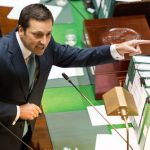Political Prejudice Shapes Perceptions of Crime

The political period in which you ‘came of age’ drastically influences your perception of crime decades later, according to a new study in the British Journal of Criminology.
While many people alter their perception of crime over time, they are generally still affected by the political context they lived in during the ages of 15 to 25, when they are forming many of their political and philosophical opinions.
These findings speak volumes about the potential impact of the way popular politicians and the media treats Muslim crime in Australia.
Findings
Researcher from the University of Sheffield and the University of Southampton analysed data on fear of crime and antisocial behaviour from the British Crime Survey in England and Wales spanning 30 years.
The researchers found a strong relationship between a respondent’s current crime fears and their political generation. For example, those who grew up under the leadership of Margaret Thatcher (1979-1990) or John Major (1990-1997) expressed the greatest level of worry about domestic burglary — the same generation who witnessed a dramatic rise in property crime during the 1980s.
Meanwhile, generation which come of age during the Harold Wilson and James Callaghan Labour governments (1974-1979) expressed the highest levels of worry about robbery and mugging, which was a key concern for politicians and policy makers at the time.
People who grew up during the Blair and Brown governments (from the late 1990s to 2010), reported the highest level of concern about local problems, such as vandalism, teenagers loitering, and noisy neighbours; when such problems were heavily legislated against.
Conclusions
The researchers asserted that this study evidenced that citizens have a greater propensity to fear the crimes that were the focus of political debate during their youth and this effect persists into adulthood.
The results reveal that crime fears can linger, and that the processes by which people form their political values can cast a long-term influence on their attitude about crime.
“Political and popular debates about crime that are prevalent in one’s youth appear to impact the fears those individuals report through adulthood and into middle age,” said one of the paper’s authors, Stephen Farrall. “In this respect, our narratives of crime and disorder tell us something important about the enduring influence of our political history and the stories we hear about crime.”
Current political discourse
The prevailing target of ‘law and order politics’ in the recent age is Muslim-Australians, who have become a popular scapegoat for all social ills and the subject of racist dog-whistling towards an ultra-conservative base.
Australian Conservative party Senator Cory Bernardi has referred to the Islamic faith as a “totalitarian, political and religious ideology”, while One Nation’s Pauline Hanson said in her maiden speech last year that Australia is “in danger of being swamped by Muslims.”
Cory Bernardi and Coalition politician George Christianson have also spoken at Q Society functions. Q Society is explicitly anti-Islamic and gained notoriety after a fundraising dinner during which speaker Larry Pickering told the audience, “If they (Muslims) are in the same street as me, I start shaking” and “I can’t stand Muslims” while auctioning off racist cartoons.
The politicians have periodically called for a burqa ban. Anti-Islam sentiment is not only seen in fringe politicians and crackpots though. As shown by public statements by Tony Abbott, a politician can rise to the top of Australian government. Only last year he suggested that a ban should be considered in places “dedicated to Australian values”, adding that “this thing is an affront to our way of life.”
Anti-Islam attitudes
A survey published in 2014 found that a quarter of Australians held anti-Muslim views; five times higher than that for any other religion despite, for example, the epidemic of child sexual abuse committed at the hands of the Catholic Church.
This anti-Islamic sentiment seems to be rising as a 2016 Essential Research poll found 49 per cent of Australians support a ban on Muslim immigration, including 60 per cent of Coalition voters, 40 per cent of Labor voters and 34 per cent of Greens voters.
The most common reasons for wanting a ban were fears over terrorism, and a belief that Muslim migrants do not integrate into society nor share Australian values. This poll came one week after Senator Hanson’s Senate speech in which she proposed that Australia halt Muslim immigration and stop building mosques and Islamic schools.
A study jointly conducted by Western Sydney University, the Islamic Sciences and Research Academy Australia and Charles Sturt University has found that Muslims who reside in Sydney are three times more likely than their non-Muslim peers to experience racism in the community.
Lasting prejudice
The above research demonstrates that the political discourse of our time has the potential to create fear and prejudice for many years to come.
Politicians should acknowledge this long-lasting damage before spouting ignorant anti-Islam sentiment or supporting anti-Islamic groups.






